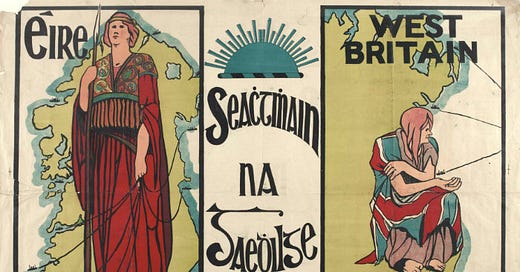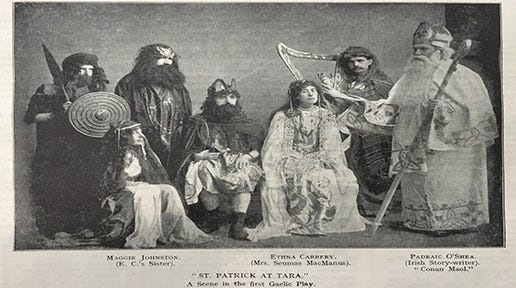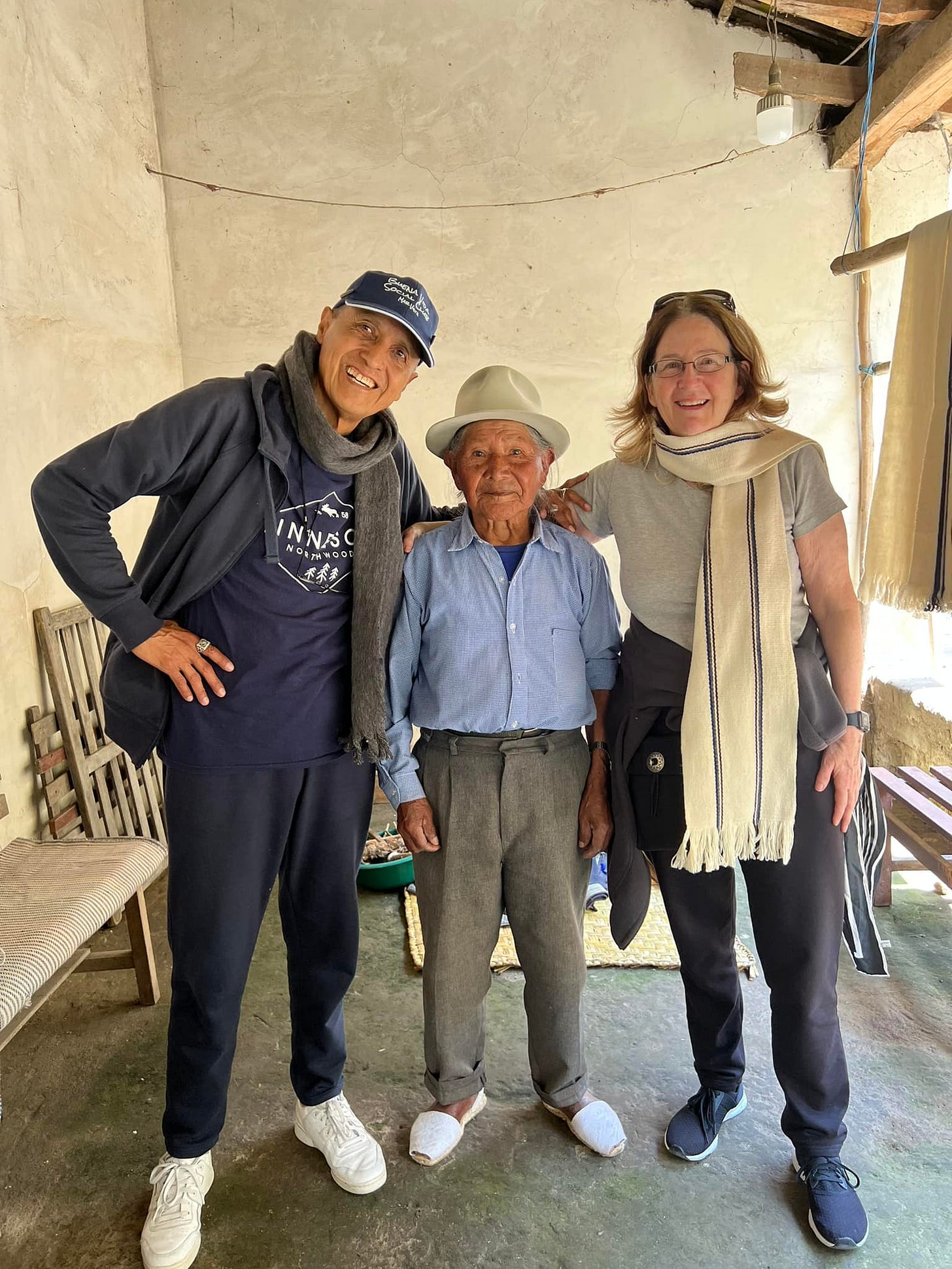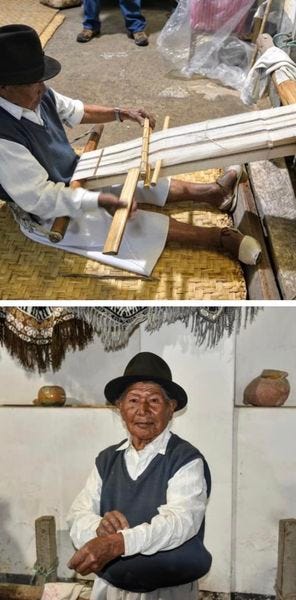The weaver, the bottle, the spin
After a visit to one of Ecuador's last remaining weavers-by-hand my wry humor gets me ghosted by the hippie heirs to Rousseau
Reading Christopher Ferguson’s Quillette review (one of their few articles not paywalled—hey, I already fork out for the NY and LA Times, WaPo, Harper’s, The Atlantic, UnHerd, and The Spectator, c’mon—and my wife tellingly for The Guardian) of the much-reviewed and much-promoted Indigenous Continent by Oxford’s Pekka Hämäläinen, I’m reminded of my recent encounter with indigeneity on display. Ferguson’s argument can be summed up in two of his many worthy quotes.
The violent migration of Europeans to the New World was very much like violent migrations throughout history and across cultures, most likely including successive waves of North American Indians (though the history there is murky). Yet instead of understanding these events in the context of larger historical patterns, the Indian Wars are cast as a morality tale in the manner of Howard Zinn, in which the actions of the European settlers are represented as uniquely reprehensible. This fantasy may be an inversion of past jingoistic and racist caricatures of American Indians as “savages,” but it is not more historically accurate. . . .
US history should be clear and accurate about the US’s misdeeds, but we should also acknowledge that the US overcame its faults to become a beacon for progress. In the same way, we should highlight the wonderful culture, arts, religion, and so on of American Indians without turning them into pious exemplars of pastoral innocence and moral instruction. Our “ethnic studies” curricula too often lapse into propaganda designed to indict and shame the West and all its works. People and cultures are complex. If students were permitted to understand that human failings are universal but can be overcome, it might help to alleviate the depression and anxiety of those unjustly burdened by the sins of their ancestors.
Now, my oldest friend on Facebook—half a century now—my junior-high classmate who teaches history at a Catholic high school in Pasadena, California, and who grew up literally around the corner from me, responded to my posting of these snippets:
Okay, so a PhD in psychology has that view. How bout a PhD in American History? I wound agree Native Americans weren’t simply acted upon, and all settlers were not all morally reprehensible. Still, it’s hard to ignore the end result - today.
As for Zinn hating America - and liberty- I couldn’t say. Maybe he just wanted it to live up to its ideals.
Points well taken. I replied:
{Y}ou raise a smart counter-argument. I've been reflecting on this in Ecuador as I observe how the indigenous community around me has been conceived as a spin on the "noble savage" both within and beyond this country for ideological, economic, and power-seeking ends. The Native students I've taught over the years, similar to the Kichwa-speakers here, guard their traditions closely, and the attempt of "us" understanding these halts as their cloak wraps around their culture, actions, and mindset, beyond our view. That encourages exploitation, condescension, romanticization, patronizing, and mythologizing by academics, tourists, bureaucrats, and politicians. As to the poverty post-1492 inflicted on millions in the Americas, no argument there.
I’ve been mulling these concerns over for a few years now. My own struggle to re-forge the broken link between Anglophone Angeleno me and my Connacht bogland Gaeilge-speaking grandparents (folks live long in my lineage) with decades of study of all things Irish, not only its difficult language, enriches my recent attempts to peek behind the ‘veil of ignorance,’ as Locke would’ve put it, invisibly cast around me here in Imbabura. And, his successor Rousseau, he of the ‘noble sauvage’ claim to fame, leaves his own spell spread over new-to-us-if-not-them terrain, not only in the Americas, but in such once- ‘pre-Conquest’ outposts as across the Celtic lands.
I’ve always been tickled by the irony that the Brits (‘West’ or original, antiquarians and then cosplayers of the Celtic Revival) idolized the Aran Islands as the spotless source of tribal lore and quaint speech when its inhabitants bore more than a trace element of English blood in them, due to the land’s occupation by forces of the Crown. (That being said, without the diligence of such ‘converts,’ that storied ‘Erse’ might have met the fate of Cornish or Manx, which lost their linguistic continuity and had to be resuscitated from their picturesque dolmen graves.) Back to the future nowadays, after me and my classmate inculcated post-MLK on the ideal of ‘Western’ society to get past ‘race” as the almighty arbiter. Not all ‘indigenous’ can be depicted in the oddly non-scientific ‘social construction’ that today demands contradictorily a reductive determinism to an essentialist identity ineradicably mixed into our melanin content, our physiognomy, our world-view, and every action or reaction we express.
Back six weeks ago, I put down my thoughts on this for the first of perhaps many times to come. As I told my classmate, it’s evident all around me, this cultural cloak.
I ruminate about this again, as a fortnight or so ago on The Leading Facebook Blog for Ecuador Expats and Those Who Aspire to this Status, Ideally as Hipsters, Hucksters or Hippies in Vilcabamba of Longevity New Age Renown (sic), I replied to its audience who’d been rhapsodizing about a weaver who being despite 90-ish, didn’t eat junk food and who lived on the purity of the Pachamama’s fertility, thus immune to illness. (Manchán Magan, one of my favorite writers, reports sagely on similar Anglo-Saxon attitudes in late-90s travelogue Angels and Rabies [my review]: A Journey through the Americas. Critiqued by my doppelganger-in-the-realms-of-cerebral-exploration-pal, journalist Tony Bailie. Which flows into his astute novel Ecopunks.)
Getting back to FB, I remarked (I cannot quote exactly for reasons to follow) that on my recent visit to said artisan, I’d noticed the closed and open bottles of Coke by the liter upright at his workshop behind his spindle or upended beyond his back-strap loom outside. Apparently this observation resulted in a Winston Smith-inspired tumble down the cyber-memory hole; all traces of this site have vanished from my Zuck-feed.
When I visited, I bought a lovely chocolate-colored wool shawl for a price about a tenth of what I expected. Alone among the other tourists, I declined a chance to pose with my purchase beside its maker. I felt this cheapened the transaction and his presence, somehow, however inexplicable. I tend wherever I go to rely on other people’s uploaded photos (as below) for documentation, as they’re better than mine.
But I did exchange a heartfelt thanks with Don Carlito, for that memory and my souvenir sufficed. (By the by, another venerable weaver not far away continues this ancient craft…Miguel Andrango’s handicraft can be bought on the spot or at the hotel that’s adjacent to me.) I heartily encourage any sojourner to support local enterprises, rather than Sino-manufactured or machine-spun wares at Otavalo’s Plaza de Ponchos.
I’ll doubtless tap out future reflections but for now, I leave you with a public image.
P.S. The weaver photos I include are posted on another FB site, one of a couple devoted to the gringo-dominated presence in Cotacachi, near Don C. in Carabuela.
P.P.S. My younger son, walking alone in La Paz, had to get rabies shots last month, as he was bitten by a cur on the road. After leaving Bolivia, he got follow-up shots in Santiago. I had to cancel my plans to deliver a paper on Magan’s book to an Irish Studies Conference, having lost the funding I’d expected, at the exact same time. This eerily echoed Magan’s travelogue’s titular event, maybe twice over, he being from Los Angeles. Like his Irish predecessor, my Irish progeny came out unscathed. Whew.
“José Carlos de la Torre is a master weaver. He is around 90 years old and still weaves in the community of Carabuela, near Cotacachi.”












Beautifully woven, thoughtful, provocative piece.